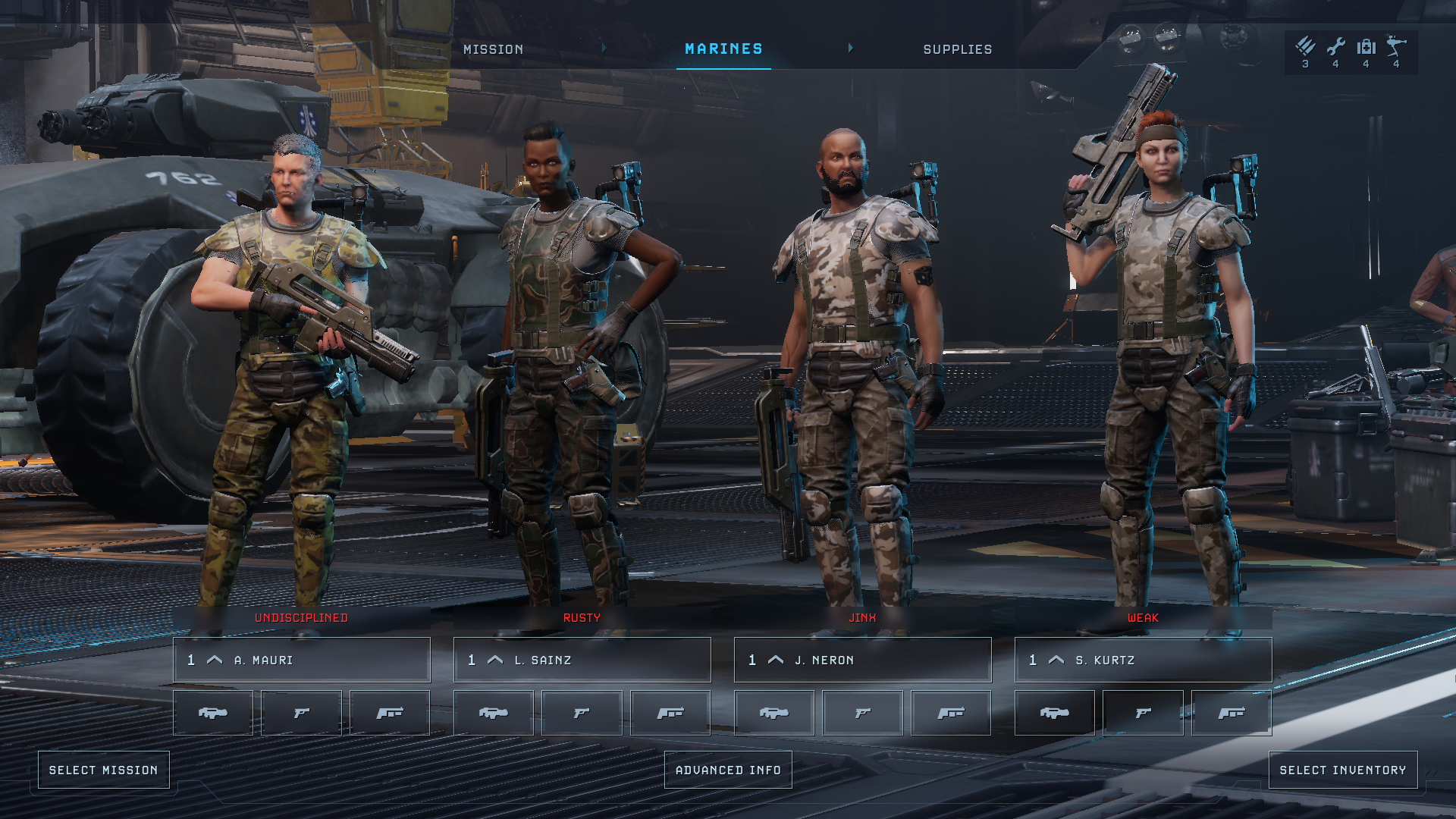Platforms:
Xbox One, PS4, PS5, Xbox Series X|S
Released:
June 20, 2023
Publisher:
Focus Entertainment
Developer:
Tindalos Interactive
The Alien franchise has had a rocky road in its foray into video game adaptations, from the tense Alien: Isolation, to the hit-or-miss Aliens: Fireteam Elite to the total misfire of Aliens: Colonial Marines. Developed by Tindalos Interactive, Aliens: Dark Descent is an ambitious RTS/survival-horror hybrid take on the Aliens universe which succeeds admirably well. Despite managing a small team of soldiers from above, the game nails the series’ trademark atmosphere and visceral action, all while telling a compelling original story set in the Aliens universe.
Aliens: Dark Descent follows the crew of the Otago, a vessel that crash lands on the isolated Weyland-Yutani colony of Lethe following a Xenomorph outbreak. After the main protagonist, Deputy Administrator Maeko Hayes, triggers a quarantine procedure trapping the crew planetside, the Otago’s crew must scavenge for resources to repair the ship and find a way to safety. To do so, they must overcome the deadly xenomorph infestation as well as a mysterious alien-worshipping Darwin Era cult. It’s a fun and tense story, homaging many famous tropes from previous Alien works as well as injecting its own original ideas. The Darwin Era, in particular, manages to be truly creepy and grotesque, without overshadowing the titular Aliens, which continue to be H.R. Giger’s most iconic creations.
The gameplay feels like a mix of XCOM‘s tactical management of a small number of soldiers, combined with the survival-horror and stress management elements of Darkest Dungeon. As you complete missions, your marines can be promoted and ranked up into various distinct classes. I quite liked the amount of customisation on display, with 5 different classes and plenty of optional perks to make each unit unique. Between missions, units need to rest to recover from their wounds, both physical and mental, as well as be potentially fitted for a prosthetic arm or leg if they happen to be the lucky survivor of a xenomorph dismemberment. Just like XCOM, you can alter your marines’ names and appearances to resemble movie characters, or your friends and family, which was a fun addition, and made me more attached to my teammates as the campaign progressed.
For a real-time strategy experience, managing your squad is a surprisingly straightforward affair in Aliens: Dark Descent. Although you control your team of around 4 marines, they move as a single cohesive unit at most times and will fire automatically at anything that goes near them. Tactical maneuvers such as taking cover or switching between walking and running are also relatively simple. The ability to slow down or pause the action to issue commands and activate special abilities is a lifesaver and makes it much easier to make sense of the alien melees when the horde attacks. You CAN split up your squad to cover more ground if you want, but the moment in an Alien movie where the characters start to split up is usually the moment characters start dying, and Aliens: Dark Descent is no exception. There is definitely strength in numbers, both on your side and for your opponents.

There is a strong emphasis on resource management. You must keep a close eye on your supply of ammo clips, medkits, tools and other materials. In addition to keeping your squad’s health up, you must also manage their stress, which builds up with each encounter. Stress resets between missions, however, you can also recover stress and health during missions by welding shelters and resting in a safe space away from the xenomorph infestation.
Failure to keep stress contained can result in exhaustion between missions and permanent traumas such as Anxiety and Pyrophobia, which can take a long time to treat. It’s a nice touch, as it keeps the tension up as you wander aimlessly in the dark, the beeping motion scanner showing enemies everywhere, while in search of the next place of safety. Spending too long in a mission without resting also causes the alien presence to increase, with more frequent and intense outbreaks, encouraging you to not take too long.
One element which differentiates Aliens: Dark Descent from XCOM and Darkest Dungeon is the lack of procedurally-generated levels. Each area is custom-designed, and while you can evac your squad and send out a fresh team if a mission has gone south, every looted crate and welded door will be exactly where you left them. I think it definitely works for this experience, as it made each mission feel appreciably distinct from one another, and aided me in becoming familiar with level layouts, shelter locations, and the most efficient routes in and out.

If anything posed a particular challenge to the game’s pacing, it is the lack of manual saves. With no manual save option from the pause menu, you are at the mercy of the game’s mercurial and sometimes oddly-placed autosaves, often set before unskippable in-engine cutscenes or repetitive dialogue lines for maximum annoyance. One mid-game mission revolving around protecting a power loader lacked any autosaves at all, making any failures very costly. This made going out of my way for the optional objectives particularly risky, as those often did not trigger autosaves, meaning a lot of progress to potentially be lost when straying from the critical path. Resting in a shelter does save the game, fortunately, however, areas you can rest in become more and more spread out later in the campaign, making it a mechanic you can’t necessarily rely upon.
“…Aliens: Dark Descent makes a strong case for the xenomorphs being a compelling threat, no matter how many guns you have.”
There are also elements to the game’s presentation that require some improvement. While the game’s overall soundtrack during missions is suitably heroic and intense, ramping up the tension as the alien horde grows near, there is a baffling lack of any music whatsoever aside from ambient Otago background sound effects during your post-mission marine promotions and reward review. This made the act of finishing the missions and overcoming the game’s challenges feel oddly anti-climactic. The XCOM games knew to end each mission with a bombastic musical track when going over what you have gained following your successful mission, so the lack of any sort of musical ambiance on the Otago in Aliens: Dark Descent feels a bit off-putting.
The portrayal of the aliens themselves in Aliens Dark Descent is one of their more fearsome showings. While I personally am more of a fan of the first Alien film’s “single alien killer” depiction, Aliens: Dark Descent makes a strong case for the xenomorphs being a compelling threat, no matter how many guns you have. Even a single runner can eviscerate your squad if you are unprepared, and more challenging opponents, such as Warriors, Crushers and Queens require specialised tactics and equipment to take down.
8
Great
Positive:
- Intriguing original tale set in the Aliens universe
- Managing your squad is surprisingly intuitive
- Decent amount of customisation, allowing you to build your preferred squad of space marines
- Integration of stress management mechanics creates compellingly tense survival scenarios
Negative:
- Lack of manual saves can cause a lot of progress to frequently be lost
- No music during post-mission briefings makes victory feel oddly anticlimactic
Aliens: Dark Descent is an excellent addition to the Aliens canon. The Darkest Dungeon-style stress mechanics end up fitting the setting like a glove, and the RTS combat and disposable marines definitely suit the tone and style of Aliens perfectly. Although the reliance on infrequent autosaves can often prove frustrating, the game is overall easy to recommend for fans of strategy games, survival horror games, or Aliens fans hungry for something which strongly evokes James Cameron’s 1986 classic while adding its own new elements.











